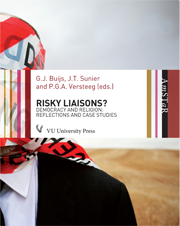05Jul 2013
New Book: Risky Liasons? Democracy and Religion: reflections and case studies.
15:39 - By Administrator - Publications
Risky Liasons? Democracy and Religion: reflections and case studies.

G.J Buijs, J.T. Sunier and P.G.A. Versteeg (eds.) VU University Press, 2013
http://www.vuuitgeverij.com/149-risky-liaisons
In a democracy, there is always the risk of antagonism, conflict and opposition rising to the surface. Most people in the West take these risks for granted and are predisposed to accept the imperfections of the system. Globally, however, democracy is not as self-evident. Actually, its acclaimed universality is highly contested. To what extent is democracy a Western, Eurocentric Project? And to what extent is this form of government compatible with other cultural and value systems?
Ιn this book, the authors address these questions by revealing how democracy is informed by religious values from a variety of traditions. In doing so, they make clear that religion and democracy are not as neatly separated as the secularist point of view would have us believe. They also question the popular opinion that Islam is at odds with democratic government, for example in the analysis of shura, an Islamic form of consultation with the people. Democratic traditions and religious value systems can, therefore, interact and co-exist in more than one way. Any reader who wants to examine these interactions, and the challenges that they pose for contemporary plural society will find this book useful.
With contributions from John Anderson, Ina ter Avest, Edien Bartels, Christoph Baumgartner, Lenie Brouwer, Herman de Dijn, Yaser Ellethy, Mohammed Girma, Matthew Kaemingk, Michiel Leezenberg, Bert Jan Lietaert Peerbolte, Siebren Miedema, Frans van der Velden, and John Witte.